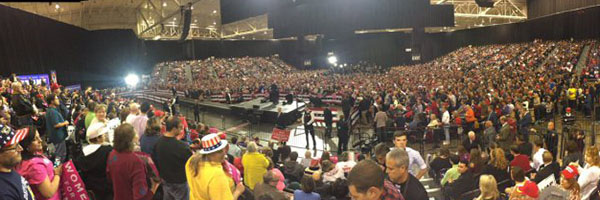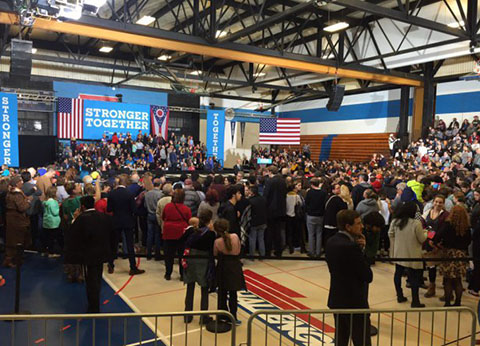Character, Julius Caesar, and Trump
Two recent articles illustrate the importance of character in a governing figure. The first is
Character Counts: What to Look for in a President, by Steven F. Hayward, Intercollegiate Review, Fall 2016. Excerpts follow:
... being a successful president involves much more than adopting the right policy positions. Think of the great presidents in our nation’s history: they have typically been people not only of ability and personality but also of high character.
This is no accident.
What is greatness, after all? In 2,400 years we have not surpassed the understanding of Aristotle, who summed up political greatness as the ability to translate wisdom into action on behalf of the public good. To be able to do this, Aristotle argues, requires a combination of moral virtue, practical wisdom, and public-spiritedness. It is not enough to have a high IQ; in fact, Aristotle goes to great lengths to show that practical wisdom “is at the opposite pole from intelligence.”
The character of the individuals who seek the presidency cannot be understood apart from the character of the office itself—both what it was designed to be and what it has become. The Founders would be appalled by the modern presidency, which bears little relation to the office the framers of the Constitution created.
The behavior of most modern presidents and candidates—personally ambitious politicians making populist appeals and offering lavish promises, often impossible to fulfill, of what they will do for the people—is precisely what the Founders wanted to avoid when they established the presidency...
Most citizens today regard the president as the center of gravity in our political system; it’s not for nothing that the president is referred to as “the leader of the free world.” But this is a wholly modern phenomenon. The Constitution begins—Article I—with Congress rather than the presidency, and before the twentieth century, Congress was considered the most important branch of government. Thomas Reed, the legendary Speaker of the House in the 1890s, turned away suggestions that he run for president because he considered it a lesser office than Speaker. Today Congress is arguably the least important of the three branches. The slow-motion inversion of constitutional philosophy that has licensed judicial activism on behalf of a “living” Constitution also aggrandized the office of the president beyond what the Founders intended.
It is remarkable nowadays to reflect that America’s Founders doubted whether our new republic should have a president or chief executive officer at all, and that it was only after long debate that they settled on creating the office of the president. Keep in mind that the chief object of criticism in the Declaration of Independence was King George III, and the political history that the Founders studied reinforced the conclusion that kings or tyrants who exercised unconstrained power are a constant threat to liberty. Many among the Founders doubted not simply whether a president or other chief executive was necessary but in fact whether it would be dangerous to have one. An “elected king” was thought no better than a hereditary king...
Clearly the Founders had in mind that the president would be the chief defender of the Constitution against the populist furies of Congress, chiefly by conducting himself in the mode of an agent—someone to execute the laws “faithfully.”...
Just as “parchment barriers” alone would be insufficient to protect liberty, the Founders understood that the character of the people who held the office would be more important than whatever specifications they attempted in the text of the Constitution. The success of the republic would depend on what Thomas Jefferson called the “moderation and virtue” of the individuals who led it—especially of the president...
Understanding the true, constitutional character of the presidency helps us understand the character traits we should look for in a president. “republican modesty” is not a slogan you’re likely to see emblazoned on a presidential campaign poster. Nor do campaigns dwell much on the elements of political greatness that Aristotle identified: moral virtue, practical wisdom, and public-spiritedness. But we would be better served seeking a president who embodies these traits than one with an ambitious “vision” for transforming American society.
The president is the focal point of the chief paradox of the republican form of self-government. To be sure, we want presidents who are what used to be called “great men,” in the profound, classical sense of the term. We want people of high character, ability, and large personality to preside over the operation of our government. In a crisis, we rightly want a statesman. But the paradox of republican government, in which we choose our temporary rulers from among the ranks of our fellow citizens, is that we want to be able to look up to our government officials without having them look down on us. This paradox applies to presidents most of all: we want to put them on a pedestal but still gaze upon them at eye level.
The most successful and popular presidents have been those who managed this paradox: those who were able to command our respect and respond to the real needs of our moment—preeminently defending the nation from foreign threats, and securing law and order—while still “connecting” with citizens as an equal.
The second article is Donald Trump Is America’s Julius Caesar, by Moses Apostaticus, Daily Caller, October 14, 2016. Here are a few excerpts:
Every so often in history a man comes along who overthrows a corrupt elite and resets the political establishment. We live in such a time. In our time that man is Donald Trump.
Establishment politicians, media and academics are now all united against Trump’s presidency. They are also all revealed as being more interested in protecting their power and their reputations than in principles, truth or serving the people. The rage of the elites against Trump is so obvious it’s shocking. They know that if Trump becomes president they face exposure...
Julius Caesar played the same role in Roman history two thousand years ago. The Roman Republic was dying, falling apart under the mismanagement and cronyism of a corrupt ruling class. Caesar was opposed by all of them, yet by sheer talent, determination and good fortune was able to make Rome great again. He brought Rome’s enemies to heel, curbed the excesses of the greedy establishment and restored the real economy so everyday Romans could prosper again.
Trump’s similarities to Caesar are striking. Both Trump and Caesar are expert deal-makers. Like Trump, Caesar was also a man of constant action, clear-headed and politically decisive. He excelled at turning defeated foes into firm friends. Both are masters at communicating directly with the people. Trump uses Twitter to distribute his message constantly to people across America. In the same way, Caesar was famous for regularly sending pamphlets back to Rome to be read directly to the people of the city. In much the same way as Trump, the Roman people saw Caesar as their champion against their oppressors.
Like Trump, Caesar made his name as the quintessential Roman winner. In Rome, that meant having military victories and conquering new lands for the empire. At this, Caesar was unparalleled. In America today, our heroes are entrepreneurs and celebrities. Trump has managed to make himself the king of both.
Like Julius Caesar, Trump has exploded onto the stage of history at a time of economic turmoil, civil unrest, falling moral standards and a sense of widespread decline. There is a yawning gap between the official version of reality put forward by the establishment media and people’s everyday experiences. Americans know that things have been going wrong now for a very long time, and that their rulers are not representing their interests...
Events which were unthinkable ten years ago are today everyday headlines that barely raise an eyebrow. Many of us can feel that there is a madness rising up in the world. After eight years of a supposedly post-racial president, there is today the risk of a race war breaking out in America. Despite the growing threat of Islamic terrorism, Hillary Clinton has indicated that she will greatly increase Muslim immigration from Middle Eastern war zones should she become president. Her performance during the second presidential debate also revealed clearly that her strategy for winning the White House involves creating a dangerous war climate against nuclear-armed Russia.
All of these frightening developments have been driven by a Democratic party elite which is being revealed as completely lawless. The ongoing revelations by WikiLeaks of insider emails and other leaks are showing us an inner circle around the Clintons which is corrupt, dishonest and ruthless...
Like Caesar, Trump has become a lightning rod for the growing discontent of the American people. Romans during the Late Republic were also fed up with a deadbeat economy which relied upon the indebtedness of the many to fund the luxuries of the few. Caesar’s solution was to grant partial amnesty on all debts to revitalize the economy by freeing up capital for enterprise. It was this move against the interests of the bankers which, more than any other, probably led to his assassination.
Caesar’s assassins were the oligarchs and politicians themselves. These men belonged to an exclusive club which was accustomed to running the government for their own benefit. Like in America, families had formed political understandings to guarantee turn-taking and political dynasties. Caesar instead brought with him talented outsiders, and preferred merit to privilege when deciding promotions. This enraged his fellow aristocrats...
Caesar overcame all his foes and became master of Rome; in the end, they had to murder him. Even then Caesar’s legacy lived on, and the force for change which Caesar unleashed in the hearts of men proved unstoppable. It was Caesar’s vision, not his opponents’, which finally triumphed.
Trump rally in Tampa on October 24, 2016 - estimated 20,000 attendance:

Trump rally in Cleveland, October 22, 2016:

Clinton rally in Cleveland, October 21, 2016:

